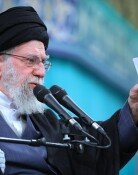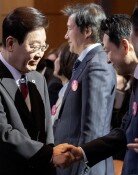[Focus] Summary of Korea-U. S. Foreign ministers` talks
[Focus] Summary of Korea-U. S. Foreign ministers` talks
Posted February. 08, 2001 21:11,
The Korea-U.S. foreign ministers` talks held in Washington on Wednesday local time proceeded in a manner that Foreign Affairs-Trade Minister Lee Joung-Binn explained the result of Seoul`s inter-Korean reconciliation and cooperation policy and signs of changes in the communist North Korea, while Secretary of State Colin Powell expressed his consensus on Lee`s views or asked some questions intermittently.
Unlike the usual style of foreign ministers` talks, the Korea-U.S. ministerial talks were mainly intended for the George W. Bush administration`s desire to precisely grasp the Seoul government`s position before the provision of its North Korea policy.
Secretary Powell held a meeting with his Korean counterpart for one and a half hours, including a luncheon, extending a 45-minute meeting originally scheduled. During their get-together, Secretary Powell reportedly was listening to Lee attentively. The Korean minister excluded the name of Kim Chong-Hoon, the ministry`s regional trade bureau director, from the final list of the Korean participants in the ministerial talks.
Reaffirmation of Korea-U. S. coordination:
The two nations issued a joint press statement, including the importance of the Korea-U.S. security alliance, positive assessment of the development in the inter-Korean relations, U.S. support for Seoul`s initiatives for inter-Korean reconciliation and cooperation, and the necessity for maintaining the Korea-U.S. policy coordination system. Korean government officials noted that every word contained in the joint statement was important to Korea, adding that the statement reflected the Korean position as a whole.
Rated as another positive result of the Lee-Powell talks, noteworthy is the fact that the American side gave a clear commitment to Korea that it would sufficiently take into account Seoul`s explanations for providing its policies toward Pyongyang.
Remaining tasks:
During their meeting, Secretary Powell reportedly asked a few questions. One of them was his inquiry on the Seoul government`s response to the various North Korean requests for South Korean aid. In a sense, this might have displayed the Bush administration`s North Korea policy line of strict reciprocity and a thorough verification.
With regard to the North`s military threats, the two sides showed some differences in their positions. Minister Lee expounded that South and North Korean defense ministers held one-on-one talks for the first time after five decades of mutual confrontation and that joint projects are under way for reconnecting the Kyongui cross-border railway, adding that the Seoul government is vigorously engaged in confidence building and inter-Korean exchanges and cooperation, involving the family-reunion program between the two Koreas. Nonetheless, Powell reserved his appraisal as whether apparent North Korean changes were real and fundamental, a participant in the Lee-Powell talks disclosed.
For another matter, the Korean side proposed to agree on the date for a summit in March between President Kim Dae-Jung and his U.S. counterpart Bush, but the United States virtually declined to do so, noting that the matter needs consultations with the White House and that it takes time for the Department of State to make full working-level preparations in this regard.
Prospects:
Most worrisome to the Korean government is the possibility that the Bush administration might establish its North Korea policy on a different track from Seoul`s current inter-Korean policies. This is because, once Washington`s policies toward Pyongyang are set, they are highly difficult to change. The related officials stated that the government has confirmed the U.S. support of Seoul`s North Korea policy, but that it is necessary for the government to solidify the bilateral coordination system through the holding of a Korea-U.S. summit at an early date.
Boo Hyung-Kwon bookum90@donga.com






![한그릇 1만5000원 봄동비빔밥 ‘품절’…제2의 두쫀쿠?[요즘소비]](https://dimg.donga.com/c/138/175/90/1/wps/NEWS/IMAGE/2026/02/27/133437451.3.jpg)
